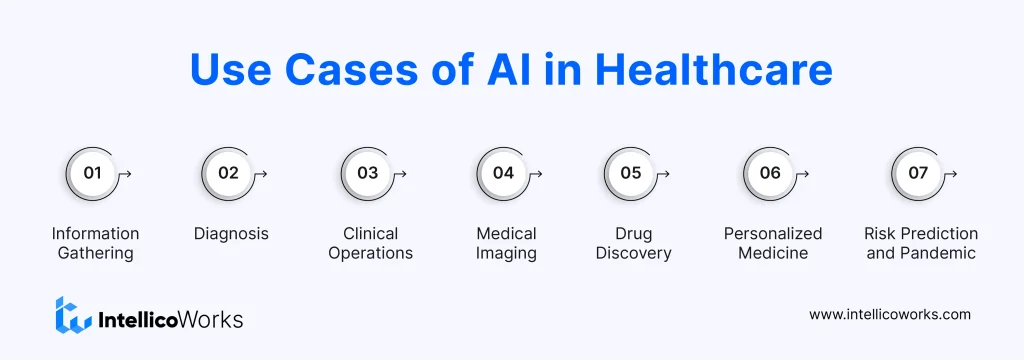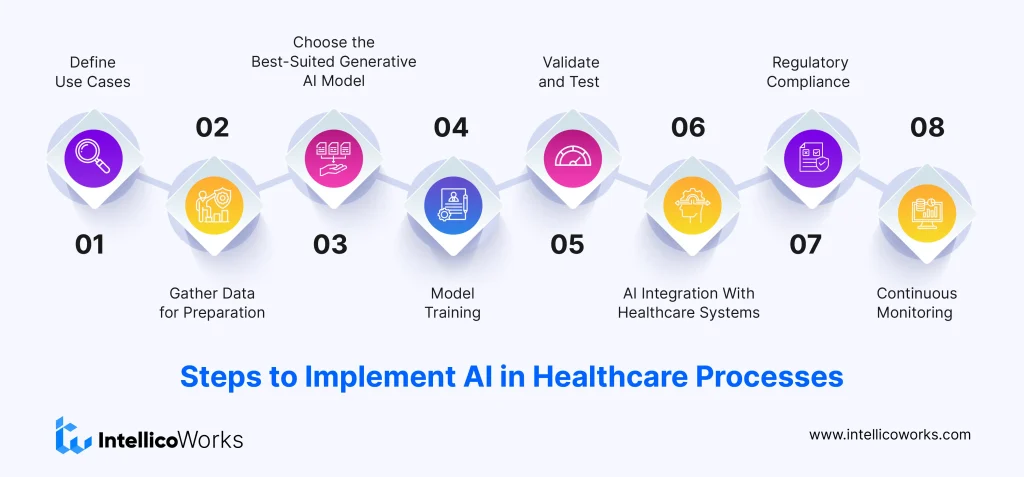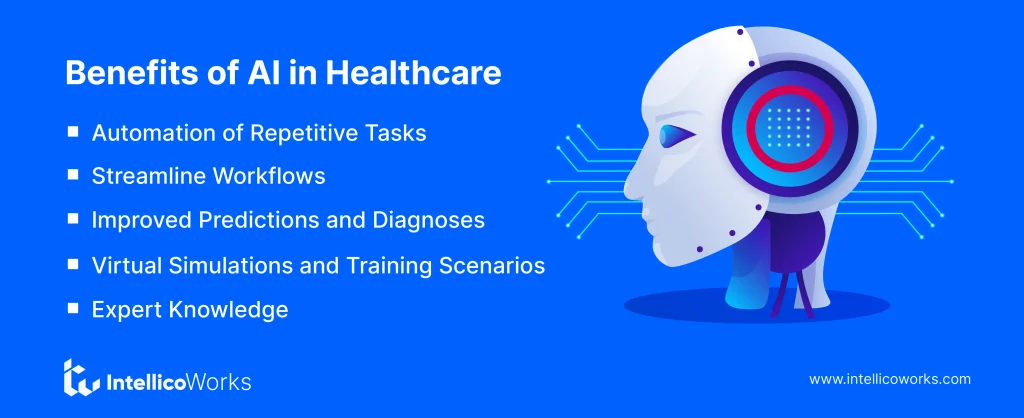When teams operate independently, it creates communication gaps that can lead to disorder. In contrast, when teams collaborate, they tend to be more efficient.
Traditional health care system has many drawbacks like labor shortages and worsening health outcomes because of unserved communities. These challenges are important to be addressed to ensure the sustainability of healthcare organizations and the well-being of humans. AI has been a big player in re-establishing medical practices like never before. According to gminsights, AI in the healthcare market size was valued at USD 1.8 billion in 2023 and is expected to reach USD 22.1 billion by the end of 2023 at a CAGR of 32.6%. Moreover 75% of major healthcare companies are currently experiencing or planning to scale generative AI. This way, Generative AI in healthcare is bringing endless possibilities and opportunities to transform medical practices.
In this blog, we will learn the AI benefits in healthcare, the challenges of AI in healthcare, generative AI use cases in healthcare and how AI in the healthcare industry is changing the way medical practices were done before.
The main challenges for traditional healthcare are data privacy and regulatory compliance. The responsible use of AI in healthcare to develop applications and choose frameworks is a complex task as per market demand. Here are some of the use cases of AI for solving many challenges in healthcare listed below:

Generative AI for healthcare can enhance information collection and reporting. AI helps engage patients in understandable language, resolves uncertainties, and summarizes data for healthcare providers. AI systems are designed to assist in collecting medical histories by conversationally posing specific questions. It can also tap into health information exchanges (HIEs) to retrieve patient medical records, analyze them, and formulate pertinent inquiries based on the patient’s medical background. AI integration in healthcare processes helps build a more comprehensive medical history for the patient. This can also be useful to physicians to provide better care. Patients who are already familiar with AI applications may find it easier to adapt and trust similar AI technologies in healthcare. AI systems perform tasks that are repetitive and carry a relatively low risk. It aligns well with the capabilities of current generative AI technologies. AI for healthcare systems are adept at handling all these processes and can perform at a satisfactory level within this domain.
AI can improve diagnostic procedures with substantial data availability. Nevertheless, achieving accurate diagnoses and mitigating biases remains challenging for less common diseases with limited data. Generative AI in healthcare systems need access to comprehensive datasets for common conditions and to avoid a balkanized AI landscape where big health systems have more proprietary data. Currently, available generative AI technologies, like ChatGPT, are trained on publicly available data only. Healthcare providers should avoid premature reliance on generic AI foundation models. They need to exercise caution in deploying AI for diagnostics in collaboration with AI development companies that understand the complexities of deploying AI tools to train on extensive medical datasets. Even after training AI systems on large medical datasets, it becomes complex to mitigate potential risks by designing workflows. In this, AI supports physicians in the diagnostic process by acting as a valuable assistant rather than a substitute.
AI can help with post-visit summaries and instructions. It generates and synthesizes care coordination notes, changes in EMRs, dictations, and messages. AI in healthcare can also assist in generating workflow materials and schedules for processes and locations by creating educational materials on disease identification and management. AI’s potential can be seen by its capability to develop personalized training journeys for clinicians across types and synthesize program requirements.
Generative AI models are really helpful with medical imaging. AI can create images for educational purposes by automatically segmenting organs or abnormalities, and predicting pathology. These models use advanced techniques like convolutional neural networks and deep learning frameworks of AI. Moreover, Generative AI in healthcare helps medical professionals train and explain medical conditions visually which saves time and streamlines the image analysis process. AI capability of predictive analytics can analyze patterns in medical images and identify pathological conditions. This analysis enables early detection and intervention that as a result improves patient outcomes.
For drug discovery, generative AI in healthcare can be used in three ways: to transform the process of drug discovery and development, clinical trials and drug repurposing. For drug discovery, AI helps accelerate the search for potential drug candidates and identifies promising molecules for further development. AI techniques like compound generation play an important role in it. Traditionally, predicting drug-to-drug interaction was complex. It was difficult to evaluate the safety and effectiveness of combining medications. The main challenge was to ensure optimal treatment outcomes with fewer risks. With the implementation of AI for healthcare systems, it enables the stratification of patients based on individual characteristics which leads to more effective medical intervention. In clinical trials, to check historical clinical data and identify appropriate patient cohorts, AI helps predict drug adverse effects and contribute to the safety evaluation of drug candidates in their development stages. Finally, in drug repurposing, generative AI can identify novel applications for existing medications and predict their efficacy against different diseases. Ultimately, AI in healthcare allows for accelerated development of treatments across various medical conditions.
GenAI in healthcare can provide tailored treatment plans based on individual patient data. AI can analyze genetic information, medical history, and clinical data. This function can result in generating personalized treatment plans that aid in selecting effective therapies and predicting individual patient responses. Predictive analytics for disease progression and treatment response can enable healthcare professionals to make informed decisions. AI can provide real-time clinical decision support to clinicians with evidence-based recommendations. This helps clinicians to generate personalized treatment options based on a patient’s genetic profile. Machine learning also contributes to resource optimization in genetic testing by streamlining workflows and automating routine tasks.
The most important generative AI use case in healthcare is revolutionizing pandemic preparedness by identifying early signs of emerging infectious diseases. AI can predict disease outbreaks, optimize vaccine development, and enhance supply chain resilience. AI processes real-time data from various sources, such as social media, health reports, and environmental data. This collected information helps identify potential hotspots for disease outbreaks. AI also helps in optimizing resource allocation during a pandemic by analyzing data on healthcare facility capacities, equipment availability, and workforce distribution. Lastly for risk prediction, Gen AI if implemented in healthcare sectors can aid in scenario planning and preparedness by simulating various scenarios based on historical data and current conditions. Ultimately, it enables a proactive and adaptive approach to pandemic response. Overall, Gen AI is transforming the way we prepare for and respond to the challenges of the pandemic.
The fusion of AI and healthcare requires a methodical approach. Taking this approach can guarantee the effectiveness of the integrated technologies for better utilization. Here is a step-by-step guide:

Identify where generative AI can help in healthcare. See use cases and their implication value in medical image analysis, natural language processing for clinical documentation, drug discovery, predictive analytics, or personalized medicine.
It is important to collect high-quality, relevant datasets for training generative AI models. Make sure to collect diverse data, representative, and compliant with privacy and regulatory standards. Then, preprocess the data to enhance model training accuracy.
Selecting the generative AI model should be based on the identified use cases. Common model architectures include GANs (Generative Adversarial Networks), VAEs (Variational Autoencoders), and language models like GPT (Generative Pre-trained Transformer).
The datasets you prepared can help train the chosen generative model. But, it depends on the complexity of the task. This may require significant computational resources. Try fine-tuning the model to achieve optimal performance for the specific healthcare application.
Validation is important in this process. By validation, check if the generative model is using separate datasets during training. Then, test the model’s performance, accuracy, and reliability to ensure it meets the desired standards for deployment in a healthcare setting.
It’s time to take the healthcare systems to the sky. Integrate the generative AI model with existing healthcare systems and workflows. Make sure they are compatible with Electronic Health Records (EHR) and other relevant tools used in the healthcare industry.
Check for data protection laws in regions like the United States and others. It is important to comply with healthcare regulations, such as HIPAA (Health Insurance Portability and Accountability Act) in the United States. Your priority should be enforcing robust security protocols to safeguard patient data.
Improvement is important. Implement systems and techniques for continuously monitoring the generative AI system’s performance. It is important to regularly update the model using new data to adapt to changing healthcare landscapes and improve accuracy.
AI can enable the healthcare industry to be more efficient and reliable by providing multifaceted benefits in processes. AI can enhance patient care, operational efficiency, and data-driven decision-making in your healthcare enterprise. Some of the key benefits are:

AI benefits in healthcare are numerous. From automating repetitive tasks and streamlining workflows to reducing human error and biases, AI enhances accurate predictions and diagnoses. It can automate tasks like data entry, administrative processes, and image analysis, saving time for healthcare professionals to focus on more critical aspects of patient care.
Generative AI can optimize healthcare workflows by allocating resources and prioritizing tasks intelligently. This leads to cost reduction and improved patient satisfaction. It schedules appointments, manages patient flow, and coordinates care for smoother operations and efficient resource utilization.
AI can help healthcare sectors achieve better diagnosis and prediction by analyzing vast patient data, including medical records, genetic information, and environmental factors. As AI models can identify patterns and relationships that may not be apparent to humans, this results in more accurate disease progression predictions, personalized treatment plans, and early detection of potential risks.
AI can help replicate a wide range of medical conditions and procedures in a safe and controlled environment. With AI in healthcare, professionals can have hands-on training without risking patient safety and provide opportunities for repeated practice and feedback.
Generative AI can generate synthetic medical data. This data comprises patient profiles and clinical scenarios, for educational purposes. This helps in providing access to diverse case studies and rare conditions to medical professionals. As a result, healthcare professionals can enhance their knowledge, learn from experts, and develop expertise in specialized areas that may be limited in real-world patient encounters.
The intersection of AI and healthcare can improve diagnostic accuracy, treatment effectiveness, and overall healthcare delivery. Here are some of the best AI-integrated medical apps that are helping improve patient care.
Google DeepMind Health is an AI research lab owned by Google. DeepMind Health collaborates with healthcare providers and research institutions to apply AI technologies in various areas of healthcare. It helps with medical image analysis, patient monitoring and predictive analytics, data management and interoperability, and streamlined healthcare workflows. Google DeepMind Health is a prominent example that places a strong emphasis on data privacy and security.
The healthcare industry has many clinical healthcare professionals like doctors and nurses. These characters are largely immune to the risks of AI replacing their jobs. It is important to note that their advanced human skills that machines cannot replicate and experience will continue to play a significant role in the healthcare industry. However, AI presents an opportunity for them to redefine their work and societal role. Healthcare organizations that are shifting to AI models allow them to spend more time with patients will allow them to continue their education and develop their medical expertise. As a result, AI will handle routine analysis, record keeping, and interpretation of scans, imaging, and other data, allowing doctors and nurses to focus on complex patient issues.
The future of Generative AI in healthcare is promising and will augment these above qualities. The intersection of these two majors will make healthcare professionals even more essential to society. Those who embrace this paradigm shift will be able to use their skills and training to cure sickness and improve patient lives in increasingly rewarding ways.
With more and more healthcare companies adopting AI applications for their healthcare systems, it is a must to be proficient in using gen-AI platforms, assessing advice, and taking corrective action. IntellicoWorks, an AI development company, assists healthcare institutions in realizing AI’s potential in patient data and care by providing AI development services. Their cloud solutions help healthcare organizations deliver quality care by utilizing data to its fullest potential. IntellicoWorks offers faster release cycles, increased efficiency, strengthened data security, and streamlined data management, ensuring data security and dependable solutions.
In this article, we argued that Generative AI in healthcare is driving unprecedented progress. However, issues regarding data privacy, ethics, and regulatory compliance must be addressed. That is why, it is critical to introduce the technology responsibly, by-laws and regulations. Collaboration between technology developers, healthcare professionals, and regulatory bodies is a must for unlocking AI’s full potential, driving innovation, improving healthcare outcomes, and positively impacting patient lives around the world.
Innovate with Confidence: Explore Our Custom AI Development Solutions!

Talk to us and let’s build something great together
A Subsidiary of Vaival Technologies, LLC
IntelliCoworks is a leading DevOps, SecOps and DataOps service provider and specializes in delivering tailored solutions using the latest technologies to serve various industries. Our DevOps engineers help companies with the endless process of securing both data and operations.
Ops
Cloud
AI & ML
Copyrights © 2023 byIntellicoworks. All rights reserved.